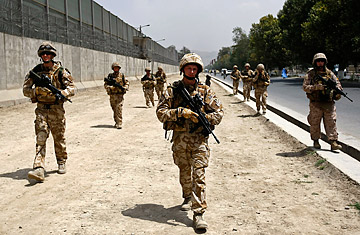
British soldiers patrol in Kabul, July 27, 2010
Even before the British Defense Ministry this week elected to scrap the Royal Navy's only fixed-wing-aircraft carrier, nobody imagined that Britannia still ruled the waves — or had any of the power that characterized its empire before the two world wars of the past century. Still, as recently as a decade ago, Britain could take solace in its "special relationship" with the sole surviving superpower, earning pride of place among U.S. allies with its readiness to commit substantial numbers of troops to Washington's expeditionary military ventures. Sure, the 46,000 troops the British sent to Iraq for the U.S.-led invasion equaled around one-third of the American force, but the U.S. military was almost 10 times larger than Britain's. In Afghanistan, also, the U.K. committed a force equivalent to one-third of the U.S. deployment. In both cases, Britain's contribution dwarfed that of other NATO allies.
But the defense spending cuts announced this week as part of the British government's massive deficit-cutting austerity program mean that the next time America goes to war in some distant land, it is unlikely to be joined by significant numbers of British squaddies. Besides scrapping (for at least a decade) its naval capacity to send air power overseas, the U.K. will cut its defense budget by 8%, losing 17,000 personnel and cutting back its armory of tanks and artillery.
The maximum number of troops that the reconfigured British military will be able to deploy in any new sustained expeditionary operation will be 6,500. While its leaders gamely insist that Britain will continue to "punch above its weight" as a military power, the message for the U.S. in Britain's contraction may be a lot more sobering than simply the retrenchment of military capability by its most trusted ally. Britain's case may have illustrated the iron law that fiscal deficits inevitably corrode a nation's ability to project power beyond its shores.
Americans may not consider the U.S. an empire, but there's no question that its military is equipped and deployed on an imperial scale. Consider the map of the area of responsibilities of its six Unified Combatant Commands — they literally cover the world, like the board game Risk. U.S. Central Command refers not to the Midwest, but to the territory that runs from Egypt eastward to the Chinese and Indian borders, and north to the Russian frontier. The Pentagon maintains more than 800 bases beyond the 50 states, and stations close to 300,000 troops abroad. The 2009 U.S. defense budget of $660 billion was more than the combined defense expenditures of the next 17 countries on the spending table. And that budget continues to rise steadily, growing at 4.8% for 2010, a year in which the U.S. economy's GDP growth is likely to be less than 2%.
Militarily, the U.S. is the British Empire of the 21st century — and then some. But it is policing the world on the back of a colossal $1.5 trillion budget deficit and a staggering $13.5 trillion national debt. Its economy is in the grip of a deep, and possibly long-term, crisis that shows little sign of reducing an unemployment rate close to 10%, let alone being in a position to make the desperately needed investments in everything from education to infrastructure necessary to restore long-term competitiveness.
The Congressional Research Service calculated last September that the U.S. has spent $1.2 trillion on military operations since the 9/11 attacks, and the ongoing commitments in Iraq and Afghanistan are costing the U.S. more than $3 billion a week. American politicians may sound the alarm on the need to slash spending to rein in deficits — but those warnings ritually add the rider "except for the military." Still, a Federal Government currently borrowing 40 cents of every dollar it spends is likely to struggle to sustain imperial levels of military commitment.
Don't expect to see a major retrenchment of U.S. military capability anytime soon — Britain's decline happened slowly, over a century. But the economic laws of gravity suggest that what we saw in Britain this week is a fate that eventually awaits the U.S. military too. After all, if the massive expansion of the U.S. economy over the past six decades appears to be coming to a close, it's hard to see how the epic expansion of the U.S. military budget over the same period can be sustained.
